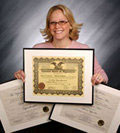Why Hypnotists Should Know the History of Hypnosis
by Calvin D. Banyan, MA, CI, BCH
The other day I was reading an email to a hypnosis interest group on one of the Web portals. In it a student of a particular hypnosis teacher went on and on about how his teacher taught several well-known hypnosis instructors. Then he went on to say how those guys were just re-packaging his teacher's materials.
Well, I'm going to write to the author of that email on the group and hopefully "shed some light" on the situation. You see, here is the problem as I see it...
In the respected professions, like medicine and psychology an important part of a student's education is learning about the history of the profession. They learn about the major influences that contributed to it and to each system or technique that they learn. This concept of properly giving credit for advancing the profession is carried through in the professional journals of the American Medical Association (AMA) and the American psychological Association (APA), for example. I know, I have written professional journal articles and had them published. Such article submissions will not get published unless the author cites who contributed to the subject that he or she is writing about.
This careful attention to the history of one's profession and the techniques that one uses prevents the problem of misattribution. And, in this case, the laying out of false claims that so and so "simply appropriated" and "repackaged" some teacher's "materials."
Here is what I think happens. Often a particular student of hypnosis may take a course from a particular teacher, and then take no other courses (at least for a while). Then after completing that course, unless the teacher informed his or her students where the techniques came from, or at least informed them that he or she did not discover, develop or invent them, then there will be a tendency among the teacher's students to attribute the material to the teacher. Of course this would be a much greater "sin" or breach of ethics if that teacher promoted the material as his own, or even worse went after others who used what they learned from that teacher when it really originated elsewhere. For example, it would be ridiculous if the University of North Dakota where I received both my BS and MA degrees in Psychology sued me for writing or teaching about Psychology!
The solution is simple. Instructors should cite where the content of their courses came from, or at least inform the students of their course that the material did not originate with that teacher. And, in deed this may need to be the case with much (or even most) of the material taught in basic and advanced hypnosis training courses, because much of the knowledge about who developed what techniques has been lost (i.e., who did the first instant induction, or who was the first to integrate Parts Work into a hypnosis session). Unfortunately for our profession, much of the techniques that the modern hypnotist uses seems to have been handed down from master hypnotist to student, sometimes simply by word of mouth, or through the demonstration of a technique, with no documentation to show where the technique actually developed.
I have encouraged some of the leadership in the profession, folks who have been around much longer than me, to actively promote and sponsor projects that can reveal the many influences of modern hypnosis. Some of the people who developed our most useful techniques may still be around, or at least they may have known those who did develop the techniques. I have discussed this project with some very important people and at least one well-known author in our field, and it looks like a project is in the works, a book that would at least discuss the history of hypnosis post-WWII. I'm totally in favor of that and it would instantly become highly recommended reading for all of my students.
In the mean time, it is time to "give credit where credit is due" or at least each teacher of hypnosis should make a point of informing his or her students that the material did not originate with that teacher, when that is the case.
For example, most of the techniques incorporated into 5-PATH® were not invented by me. I did not invent instant and rapid inductions, depth testing, the use of convincers, age regression, parts work, or the concept of using forgiveness as a healing modality, all of which are incorporated into the system. (I don't believe that anyone alive today can take credit for the development of those techniques.)
But, of course, I have added to what I have learned and that new information came from my use of the techniques and from training and supervising others who now use 5-PATH®. I'll take credit for what I have added, but not even a little bit more. I hope that others will take on this approach. The profession will gain much by it.



